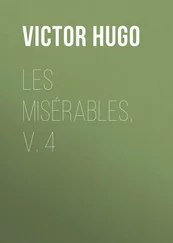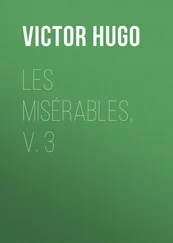M. Myriel had arrived at D—— accompanied by an elderly spinster, Mademoiselle Baptistine, who was his sister, and ten years his junior.
Their only domestic was a female servant of the same age as Mademoiselle Baptistine, and named Madame Magloire, who, after having been the servant of M. le Cure, now assumed the double title of maid to Mademoiselle and housekeeper to Monseigneur.
Mademoiselle Baptistine was a long, pale, thin, gentle creature; she realized the ideal expressed by the word "respectable"; for it seems that a woman must needs be a mother in order to be venerable. She had never been pretty; her whole life, which had been nothing but a succession of holy deeds, had finally conferred upon her a sort of pallor and transparency; and as she advanced in years she had acquired what may be called the beauty of goodness. What had been leanness in her youth had become transparency in her maturity; and this diaphaneity allowed the angel to be seen. She was a soul rather than a virgin. Her person seemed made of a shadow; there was hardly sufficient body to provide for sex; a little matter enclosing a light; large eyes forever drooping;— a mere pretext for a soul's remaining on the earth.
Madame Magloire was a little, fat, white old woman, corpulent and bustling; always out of breath,—in the first place, because of her activity, and in the next, because of her asthma.
On his arrival, M. Myriel was installed in the episcopal palace with the honors required by the Imperial decrees, which class a bishop immediately after a major-general. The mayor and the president paid the first call on him, and he, in turn, paid the first call on the general and the prefect.
The installation over, the town waited to see its bishop at work.
Chapter 2 M. Myriel becomes M. Welcome
The episcopal palace of D—— adjoins the hospital.
The episcopal palace was a huge and beautiful house, built of stone at the beginning of the last century by M. Henri Puget, Doctor of Theology of the Faculty of Paris, Abbe of Simore, who had been Bishop of D—— in 1712. This palace was a genuine seignorial residence. Everything about it had a grand air,—the apartments of the Bishop, the drawing-rooms, the chambers, the principal courtyard, which was very large, with walks encircling it under arcades in the old Florentine fashion, and gardens planted with magnificent trees. In the dining-room, a long and superb gallery which was situated on the ground-floor and opened on the gardens, M. Henri Puget had entertained in state, on July 29, 1714, My Lords Charles Brulart de Genlis, archbishop; Prince d'Embrun; Antoine de Mesgrigny, the capuchin, Bishop of Grasse; Philippe de Vendome, Grand Prior of France, Abbe of Saint Honore de Lerins; Francois de Berton de Crillon, bishop, Baron de Vence; Cesar de Sabran de Forcalquier, bishop, Seignor of Glandeve; and Jean Soanen, Priest of the Oratory, preacher in ordinary to the king, bishop, Seignor of Senez. The portraits of these seven reverend personages decorated this apartment; and this memorable date, the 29th of July, 1714, was there engraved in letters of gold on a table of white marble.
The hospital was a low and narrow building of a single story, with a small garden.
Three days after his arrival, the Bishop visited the hospital. The visit ended, he had the director requested to be so good as to come to his house.
"Monsieur the director of the hospital," said he to him, "how many sick people have you at the present moment?"
"Twenty-six, Monseigneur."
"That was the number which I counted," said the Bishop.
"The beds," pursued the director, "are very much crowded against each other."
"That is what I observed."
"The halls are nothing but rooms, and it is with difficulty that the air can be changed in them."
"So it seems to me."
"And then, when there is a ray of sun, the garden is very small for the convalescents."
"That was what I said to myself."
"In case of epidemics,—we have had the typhus fever this year; we had the sweating sickness two years ago, and a hundred patients at times,—we know not what to do."
"That is the thought which occurred to me."
"What would you have, Monseigneur?" said the director. "One must resign one's self."
This conversation took place in the gallery dining-room on the ground-floor.
The Bishop remained silent for a moment; then he turned abruptly to the director of the hospital.
"Monsieur," said he, "how many beds do you think this hall alone would hold?"
"Monseigneur's dining-room?" exclaimed the stupefied director.
The Bishop cast a glance round the apartment, and seemed to be taking measures and calculations with his eyes.
"It would hold full twenty beds," said he, as though speaking to himself. Then, raising his voice:—
"Hold, Monsieur the director of the hospital, I will tell you something. There is evidently a mistake here. There are thirty-six of you, in five or six small rooms. There are three of us here, and we have room for sixty. There is some mistake, I tell you; you have my house, and I have yours. Give me back my house; you are at home here."
On the following day the thirty-six patients were installed in the Bishop's palace, and the Bishop was settled in the hospital.
M. Myriel had no property, his family having been ruined by the Revolution. His sister was in receipt of a yearly income of five hundred francs, which sufficed for her personal wants at the vicarage. M. Myriel received from the State, in his quality of bishop, a salary of fifteen thousand francs. On the very day when he took up his abode in the hospital, M. Myriel settled on the disposition of this sum once for all, in the following manner. We transcribe here a note made by his own hand:—
NOTE ON THE REGULATION OF MY HOUSEHOLD EXPENSES.
For the little seminary … … … … . . 1,500 livres Society of the mission … … … … . . 100 " For the Lazarists of Montdidier … … … . 100 " Seminary for foreign missions in Paris … … 200 " Congregation of the Holy Spirit … … … . 150 " Religious establishments of the Holy Land … . . 100 " Charitable maternity societies … … … . 300 " Extra, for that of Arles … … … … . 50 " Work for the amelioration of prisons … … . 400 " Work for the relief and delivery of prisoners … 500 " To liberate fathers of families incarcerated for debt 1,000 " Addition to the salary of the poor teachers of the diocese … … … … … … . 2,000 " Public granary of the Hautes-Alpes … … . . 100 " Congregation of the ladies of D——, of Manosque, and of Sisteron, for the gratuitous instruction of poor girls … … … … … … . . 1,500 " For the poor … … … … … … . 6,000 " My personal expenses … … … … … 1,000 " ——— Total … … … … … … . . 15,000 "
M. Myriel made no change in this arrangement during the entire period that he occupied the see of D—— As has been seen, he called it regulating his household expenses.
This arrangement was accepted with absolute submission by Mademoiselle Baptistine. This holy woman regarded Monseigneur of D—— as at one and the same time her brother and her bishop, her friend according to the flesh and her superior according to the Church. She simply loved and venerated him. When he spoke, she bowed; when he acted, she yielded her adherence. Their only servant, Madame Magloire, grumbled a little. It will be observed that Monsieur the Bishop had reserved for himself only one thousand livres, which, added to the pension of Mademoiselle Baptistine, made fifteen hundred francs a year. On these fifteen hundred francs these two old women and the old man subsisted.
And when a village curate came to D——, the Bishop still found means to entertain him, thanks to the severe economy of Madame Magloire, and to the intelligent administration of Mademoiselle Baptistine.
Читать дальше












